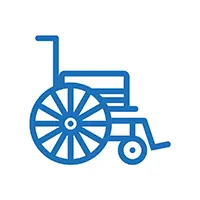Video details
Video title: When your child becomes paraplegic
Video duration: 7:10
Page(s) this video appears on:
Video transcript
[Music playing]
[Music volume fades to background level]
Joshua: So my name's Joshua Perry, I have cerebral palsy and I run my own business.
[Music volume rises]
Joshua Perry is the CEO of Enabling Love, an inclusive dating service that caters for people with disabilities.
Joshua: I felt like there was a need to get, um, more disabled people socialising in mainstream situations.
For example, I hardly used to see, um, disabled people at bars, disabled people at night clubs and I think if we get, um, disabled people into those situations, a lot more then it's gonna be better, um, for society in the long term.
[Music volume rises]
Joshua has a personal assistant to help him run Enabling Love.
[Music volume fades to background level]
[Bronywn Ramsay, Joshua’s assistant]
Bronwyn: Whatever he says, I do. We, yeah, catch up with emails and registrations of members and prepare pamphlets and bits and pieces for events.
[Sound of door opening]
Joshua: Yeah, yeah
Bronwyn: Whatever he's got on his mind, and he comes up with lots of ideas
Joshua: And it's quite intensive, isn't it?
Bronywn: It's all go with him, it's never a dull moment
Joshua: Yeah, yeah
Interviewer: So what do disabled people struggle with when it comes to dating?
Joshua: Um. They struggle with knowing what to say, um knowing how to say it, knowing how to express themselves. It depends on the individual disability of course, case by case but um, there are different techniques that you can use, yeah.
Interviewer: How do you try to help people with that?
Joshua: Um, by just giving them a safe platform that they can, um, use but also feel confidence.
[Music volume rises]
Joshua is working on developing an app for Enabling Love. He says starting this business is one of his proudest achievements.
[Music stops playing]
Interviewer: Tell me about some of the other things that you've done that you're proud of.
Joshua: Um, well I've stood for the ACT Party in 2017 at the last election, um I have also been the first disabled person down the catwalk at New Zealand fashion week. [Music playing] That was a huge moment because I felt like, well, I can, I can actually change people's views about disability when it comes to fashion and the media and that was huge.
[Music volume rises]
Joshua is passionate about politics and wants to become an MP.
[Music volume drops to background level]
Joshua: I, um, hope to be the first disability minister actually, in a wheelchair, so that would be pretty special. I think that's going to be an, an important thing to achieve in years to come because it will give disabled people the confidence to go for politics.
[Music volume rises]
He believes it’s important that people with disabilities are represented in government.
[Music volume fades to background level]
Joshua: Just trying to, um, ensure that disabled people get a voice when it comes to things like, um, achieving their goals, um, uh, creating innovation, um, and ensuring that they have a good life for themselves.
[Music plays at background level]
Interviewer: What does it mean for you to have a good life?
Joshua: Um, being around friends, and also, um, being independent, um, um, making sure I have my own voice.
[Music volume rises]
Joshua enjoys living independently in a place he owns with his parents.
[Music volume fades to background level]
[Joshua introducing his house]: So welcome to my property. We got this place in January of last year which is 2018. Yeah I've just been, um, very lucky to find this place and it's something that I plan to renovate.
[Music volume rises]
Joshua says having individualised funding has been hugely positive for him.
[Music volume fades to background level]
Joshua: It helps me, um, ah, from day to day make my own decisions in regards to, um, who I want caring for me and I'm able to employ my own people so that's really good. I have guys that come in to get me up in the morning to put me into bed at night, to give me lunch when I'm on my lunch break at work and stuff like that. All the usual stuff that comes with living with disability, yeah.
Interviewer: How important is that, that you are able to make those decisions and someone else isn't making them for you?
Joshua: It's very important, because it gives you, um confidence to achieve your goals that you want to achieve like I was saying before and um, yeah, it's also very good because it means you can, uh, change the times that you want them to come and go and, yeah… do whatever [laughs].
Interviewer: What do people assume when they... look at you what do think they're thinking?
Joshua: Ah, Oh, he's um, dis-disabled, he can't do much. Yep.
Interviewer: You wanna prove them wrong.
Joshua: Yep. Exactly, um, I think if.. you can prove people wrong then people will respect you a lot more [laughs].
Interviewer: Ok so you've found that the biggest challenge is actually people's incorrect perceptions of you.
Joshua: Yeah. Not just for me, of, of everyone who's got a disability, but mind you we've all got disabilities in our own way, you know. So, yep. You've just got to rise to… the… challenge and not let anything, um stand in your way to getting to your goals and that's what I have done.
[Music volume rises]
Joshua has a strong network of friends who have helped him be successful.
[Music volume fades to background level]
Joshua: There's so many people that I would like to thank, um, who have helped me get to this point. I honestly would like to thank all my friends watching this. You know who you are so, thank you [laughs].
[Music plays outro]
Last updated on Tuesday, 28 May 2019













